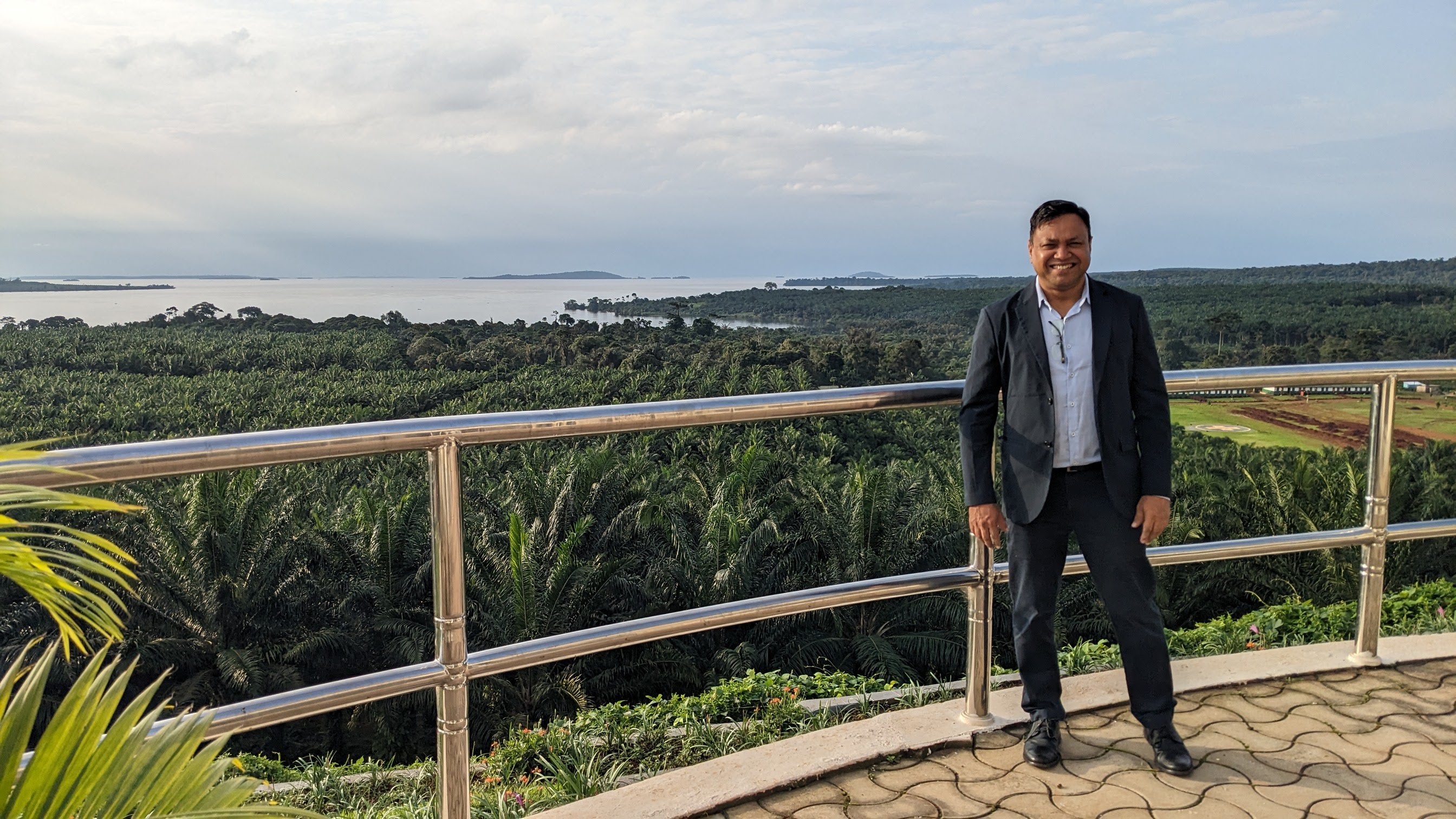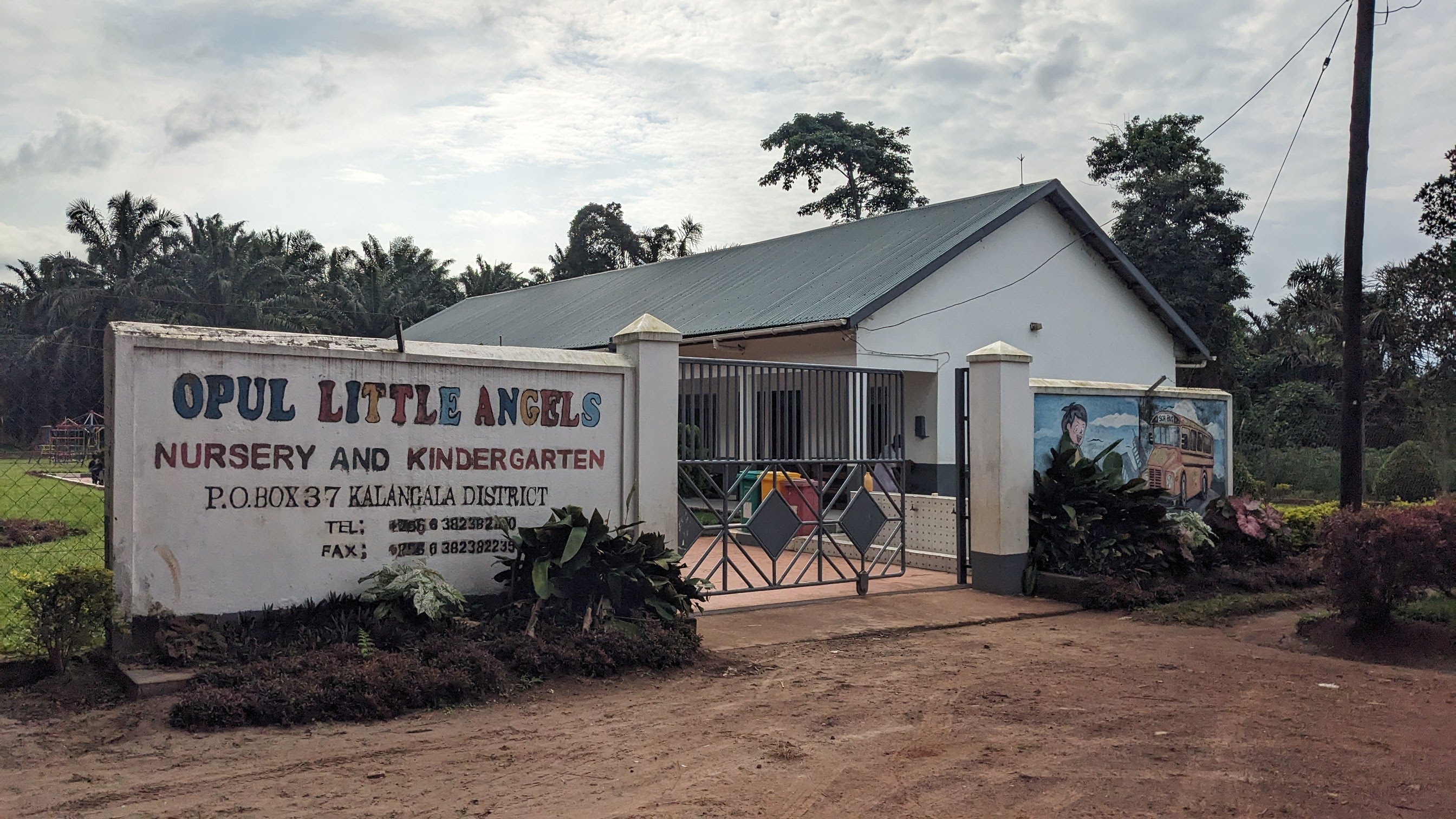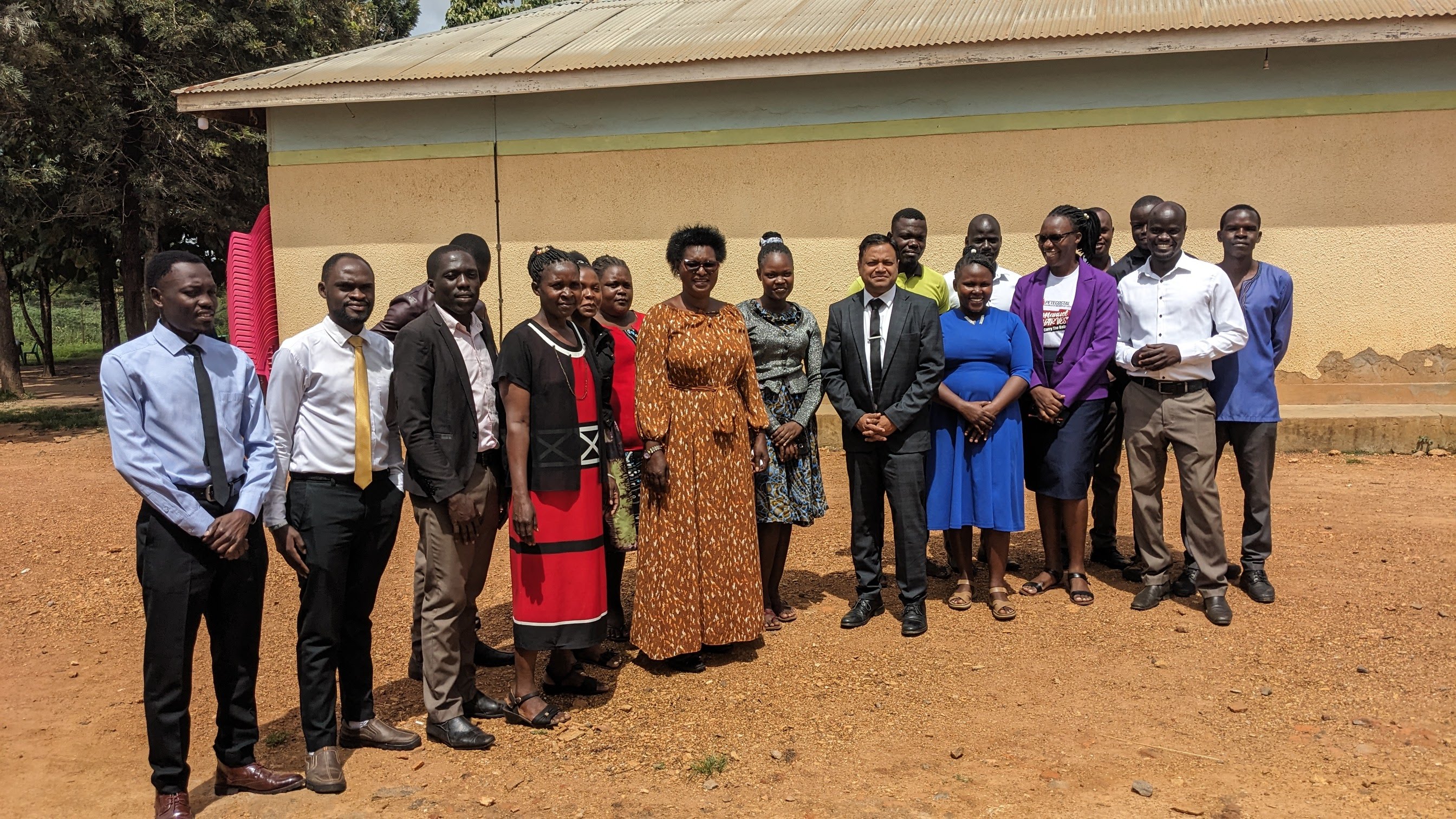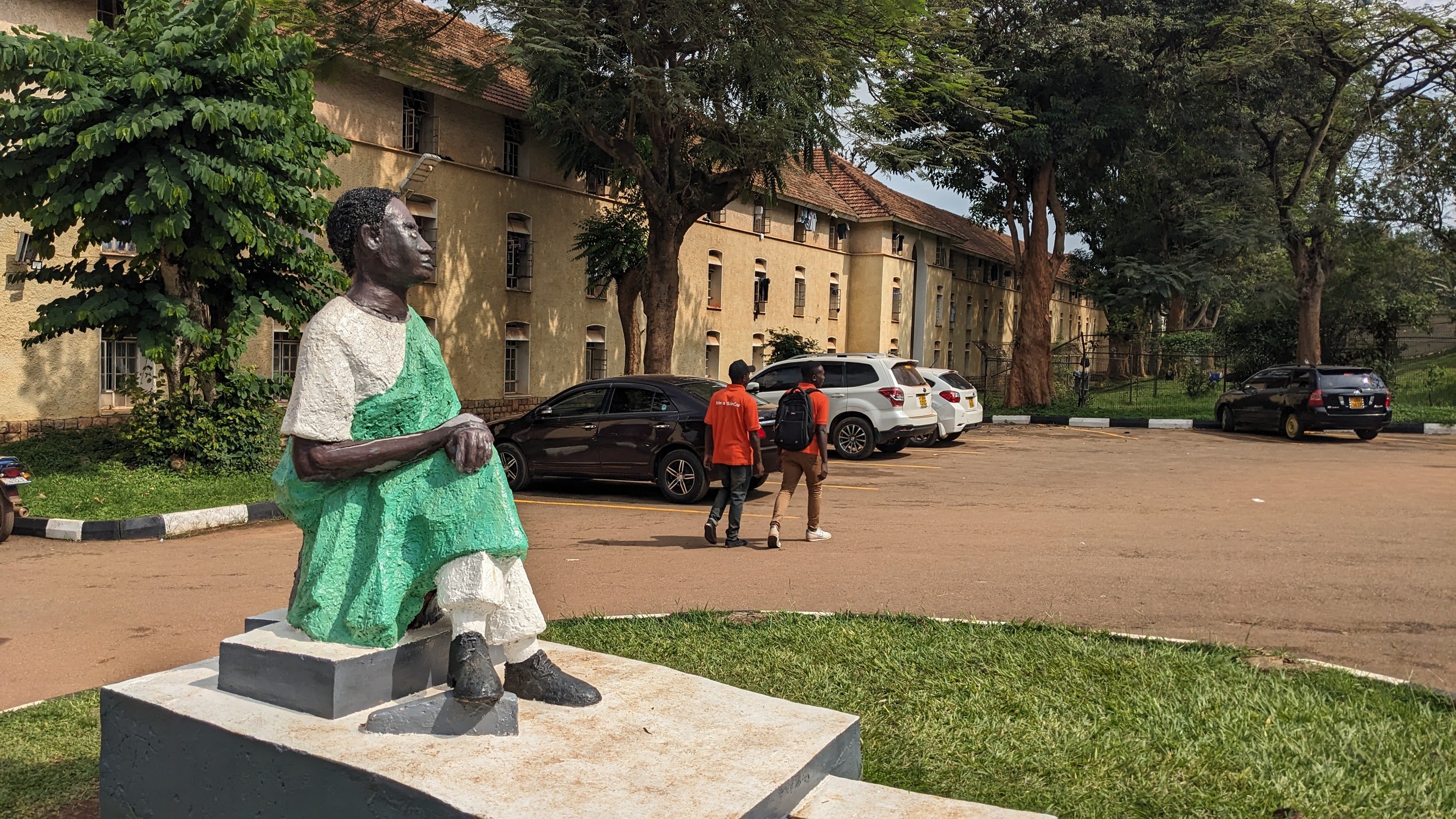Centre Director visits Uganda
The Ministry of Agriculture, Animal Industry and Fisheries of Uganda invited Amit Jain to the east African republic
 Amit Jain addresses Serere farmers.
Amit Jain addresses Serere farmers.
The Director of the NTU-SBF Centre for African Studies made his maiden official trip to the landlocked East African republic of Uganda this month (Nov) at the invitation of Hon Hellen Adoa, the Minister of State for Fisheries. He arrived in Entebbe on 17 Nov and was taken to see palm oil plantations at Kalanga which is located on the island of Bugala on the Ugandan part of Lake Victoria. The stunningly beautiful island, which can only be reached by a ferry, was once a think forest infected by the deadly tsetse fly. Today it has a thriving fishing, tourism and oil palm farming district with a population of over 66,300 residents. The 11000-hectare (approx) plantation is managed by Oil Palm Uganda Ltd (OPUL) – a joint venture between Kenya-based edible oil manufacturer BIDCO and Singapore-based palm oil conglomerate Wilmar.
The firm signed an agreement with the government of Uganda in 2002 to develop the palm oil industry in the country. The government facilitated the acquisition of the land for the plantation and provided the basic public infrastructure (such as roads, electricity and transport) enabling the firm to clear the land for plantation and begin operations. The first planting was done in 2005, and harvest commenced in 2009.
 Amit Jain at OPUL oil palm plantation.
Amit Jain at OPUL oil palm plantation.
Commercial Palm Oil plantation is an activity that typically receives a bad press. Civil society activists at home and abroad have accused OPUL of ‘land grab’ and environmental damage. In 2004 the World Bank withdrew from the project amid concern that it was not complying with the bank’s forestry policies. But OPUL has remained resolute amidst all the controversy and was keen to show the Centre Director the economic and social contribution they have made through their investments.

More than 2000 smallholder farmers now supply OPUL with their produce. In return they get a steady and assured income from the off taker. It is a hardy tree crop that does not need too much tending. Not only does a palm oil tree take a short time to grow (4-5 years) it can be harvested every 10-12 days. The infrastructure built to support the project has been a boost to the local economy with the previously uninhabited island now receiving weekend tourists who stay at the few luxury resorts that have come up on the shores. Although there no paved roads on the island small enterprises have sprung up all over the island providing essential goods and services such as provision, pharmacy, mobile phones and even haircut. OPUL showed Centre Director the clinic they operate for farm workers. It looked reasonably well equipped with nursing staff and medicines. Amit also visited an OPUL sponsored kindergarten and primary school. The firm is also financially supporting the construction of a local Cathedral. Uganda, which is predominantly Christian is a deeply religious society. Later, on his way to Soroti, Amit was given a tour of the MT1500 Bidco refining and processing plant where they package and produce everyday consumables like soap and edible oil.
 OPUL-sponsored kindergarten.
OPUL-sponsored kindergarten.
The centre piece of the visit, however, was a presentation on the prospect of Africa’s blue economy, which Amit presented in the northern Ugandan town of Serere. The talk, which was attended by over 100 aquaculture farmers and local officials, was organised by Hellen Adoa the Minister in charge of Fisheries. He defined the blue economy is any sustainable economic activity dependent on the ocean or a large water body.
 Amit Jain with Minister Hellen Adoa and members of Serere District Council.
Amit Jain with Minister Hellen Adoa and members of Serere District Council.
Uganda possesses immense potential for aquaculture. Although Uganda is a landlocked state it shares Lake Victoria with Kenya and Tanzania. The fisheries sub-sector here supports at the livelihood of 5 million people and provides essential protein for up to 17 million people. 40% of the fish catch in Uganda is process and exported. Fish and fish products already account for around 15% of Ugandan exports. Aquaculture is a small cottage industry in Uganda contributing barely 0.6% to the GDP. But it is growing at over 10% annually. As the population of the country grows so will consumption. By 2055 farmed fishing in Uganda is expected to yield up to 1 million MT of fish.
Catfish is the most popular species for aquaculture in Uganda, contributing about 60 percent of farmed aquaculture production. Compared to Tilapia, the species is highly versatile. They are bottom dwelling and not easily washed off by flooding, which is becoming more frequent as climate change occurs.
In his presentation Amit Jain urged local fish farmers to look at aquaculture in a more holistic manner. He emphasised the importance of the entire value chain – form farm to fork. He advised them continually to stay abreast of the latest technologies and continually improve their technical and farming techniques. By moving up the value chain, farmers could increase their incomes and ensure long-term sustainability of their industry.
On the sidelines of the trip, Minister Adoa also took Amit to the two schools she runs in her district where he was met with several students, teachers and staff. He also visited the famed Makerere University where he met with Dr Anthony Tibaingana and his colleagues from the College of Business and Management Sciences. The two sides exchanged views on research collaboration. He also held discussions with Prof Goretta Nabanoga of the College of Agricultural and Environmental Sciences.
 Nkrumah hall at Makerere University.
Nkrumah hall at Makerere University.














/enri-thumbnails/careeropportunities1f0caf1c-a12d-479c-be7c-3c04e085c617.tmb-mega-menu.jpg?Culture=en&sfvrsn=d7261e3b_1)

/cradle-thumbnails/research-capabilities1516d0ba63aa44f0b4ee77a8c05263b2.tmb-mega-menu.jpg?Culture=en&sfvrsn=1bc94f8_1)







